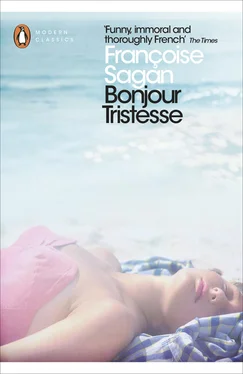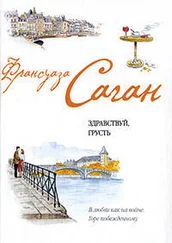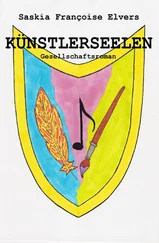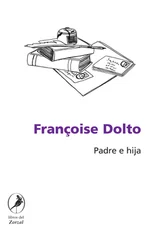‘Me too,’ I said. ‘But have you just come all the way from Paris?’
‘I decided to drive here and now I’m exhausted.’
I showed her to her room. I opened the window in the hope of catching sight of Cyril’s boat but it had disappeared. Anne had sat down on the bed. I noticed the little shadows round her eyes.
‘This is a gorgeous villa,’ she said, breathing a sigh. ‘Where is the master of the house?’
‘He’s gone to fetch you at the station with Elsa.’
I had put her case down on a chair and, turning back in her direction, I received a shock. Her face had suddenly crumpled and her mouth was trembling.
‘Elsa Mackenbourg? He’s brought Elsa Mackenbourg here?’
I could think of nothing to say by way of reply. I looked at her, dumbfounded. That face of hers, which I had only ever seen so calm and controlled, now lay open to my astonished scrutiny. She was staring at me through the fog of images that my words had conjured up for her. At length she actually saw me and she turned her head away.
‘I should have let you know in advance,’ she said, ‘but I was in such a hurry to get away, I was so tired …’
‘And now …’ I continued mechanically.
‘Now what?’ she said.
She was looking at me in a disdainful, interrogatory way, as if nothing had happened.
‘Now you’ve arrived,’ I said lamely, rubbing my hands together, ‘I’m very pleased you’re here, I really am. I’ll wait for you downstairs; if you’d like a drink, the bar has everything.’
I stammered my way out of the room and went down the stairs with my thoughts in a whirl. Why had she looked like that? Why that troubled voice and that faltering of hers? I sat down on a recliner and closed my eyes. I tried to remember Anne’s many faces, faces that had looked severe or reassuring, that had expressed irony, effortlessness or authority. I was both touched and irritated at having, for the first time, seen her appear vulnerable. Could it be that she loved my father? Was it even possible for her to love him? There was nothing about him that matched her tastes. He was weak-willed, frivolous, at times supine. But perhaps she was simply tired after her journey or filled with moral indignation. I spent an hour surmising.
At five o’clock my father arrived back with Elsa. I watched him get out of the car. I tried to work out whether Anne could ever love him. He walked briskly towards me with his head tilted back a little. He was smiling. I decided that it was quite possible for Anne to love him, indeed for anyone to love him.
‘Anne wasn’t there,’ he called to me. ‘I hope she hasn’t fallen out of the train.’
‘She’s in her room,’ I said. ‘She came by car.’
‘Really? But that’s wonderful! Would you mind just taking the bouquet up to her?’
‘Did you buy me flowers?’ called Anne’s voice. ‘That’s too kind of you!’
She was making her way downstairs to meet him, relaxed and smiling, in a dress that gave no appearance of having just been unpacked. I was sad to think that she had come down only on hearing the car, when she might have done so a little sooner to talk to me, even if it had only been about my exam, which, as it happened, I had failed. I drew some comfort from that last consideration.
My father, having rushed forward, was kissing her hand.
‘I spent a quarter of an hour on the station platform clutching this bunch of flowers with a silly smile on my face. Thank heavens you’re here! Do you know Elsa Mackenbourg?’
I looked away.
‘We must have met somewhere,’ said Anne, all charm. ‘My room is lovely. It’s extremely kind of you to have invited me here, Raymond. I was very tired.’
My father was in high spirits. As he saw it, everything was going well. He was talking extravagantly and opening bottles. But I kept seeing Cyril’s passionate face alternating with that of Anne’s, both faces marked by intense emotion, and I wondered if the holidays would be as straightforward as my father had said they would be.
That first dinner was very lively. My father and Anne talked about their mutual acquaintances who, although few in number, were colourful characters. I was enjoying it all very much until Anne declared that my father’s business partner had the brain of a flea. This was someone who drank a lot, but he was kind, and my father and I had had some memorable dinners with him.
I protested, saying: ‘Lombard is funny, Anne. I’ve seen him be very amusing.’
‘Even so, you must admit that he’s inadequate, and even his humour …’
‘His type of intelligence isn’t perhaps very common but …’
She interrupted me patronizingly:
‘What you call types of intelligence quite simply amounts to normal intelligence at different ages.’
I was very taken by the elegant finality of her formulation. Certain phrases strike me as having a subtle, intellectual resonance that I find captivating, even if I cannot entirely fathom their meaning. What Anne had just stated made me want to have a little notebook and pencil to hand. I told her so. My father burst out laughing.
‘At least you don’t bear grudges.’
I couldn’t possibly do that, for Anne was not malicious. I felt that she was too utterly aloof to be malicious; the judgements she passed did not have the precise, cutting edge of spite. But they were all the more crushing for it.
That first evening Anne did not seem to notice Elsa’s absent-mindedness, whether feigned or not, in going straight to my father’s bedroom. She had brought me a sweater from her collection but would hear no word of thanks. She was bored by expressions of thanks, and as mine were never equal to my actual enthusiasm for a particular gift, I did not waste my breath.
‘I think Elsa is very sweet,’ she said, as I was about to leave.
She was looking straight at me, without smiling; she was seeking out some thought of mine that she wanted at all costs to eradicate. I was to forget her earlier reaction.
‘Yes, yes, she’s – um – a charming girl, really nice,’ I stammered.
She broke into a laugh and I went off to bed feeling very irritated. I fell asleep thinking of Cyril, who was perhaps in Cannes dancing with girls who were anything but nice.
I realize that I have been forgetting – indeed, that I have had to forget – the most important things: the ever-present sea with its incessant rhythm, and the sun. Nor can I bear to recall the four linden trees in the courtyard of a provincial boarding school and their scent, or my father’s smile as he stood on the station platform two years earlier when I left boarding school – a smile of embarrassment because I had plaits and was wearing a horrid dark-coloured dress. Then, once we were in the car, there had been his burst of sudden, triumphant joy because I had his eyes and his mouth and because I was going to be for him the dearest, most marvellous of toys. I knew nothing, and he was going to show me Paris and introduce me to a life of luxury and indulgence. I do believe that most of the things I took pleasure in during that period simply came down to money – the pleasure of fast driving, of having a new dress, of buying records and books and flowers. I am still not ashamed of enjoying those shallow pleasures, and anyway I only call them shallow because I’ve heard people say they are. It would come more naturally to me to regret or disown any distress or fits of mysticism I may have had. My love of pleasure and happiness constitutes the only consistent aspect of my character. Perhaps I haven’t read enough. At boarding school you don’t read, apart from ‘improving’ books. In Paris I didn’t have time to read: when my classes were over, friends would drag me off to the cinema; they were astonished that I didn’t know the names of the actors in the films. Or they would whisk me off to sit in the sun on café terraces; I revelled in the pleasure of being part of the crowd and having a drink and being with someone who would look into your eyes, take your hand and then lead you away from that same crowd. We would walk through the streets as far as my house. There he would draw me into a doorway and kiss me. I discovered the pleasure to be had from kissing. I am not able to put a specific boy’s name to these memories – whether it was Jean or Hubert or Jacques, which are names familiar to all nice young girls. In the evening I would advance in years and would accompany my father to parties that I had no business being at, all sorts of parties that I found entertaining and at which, being so young, I was myself a source of entertainment. When we got home my father would drop me off and, more often than not, would drive his girlfriend back to her place. I wouldn’t hear him come back in.
Читать дальше












